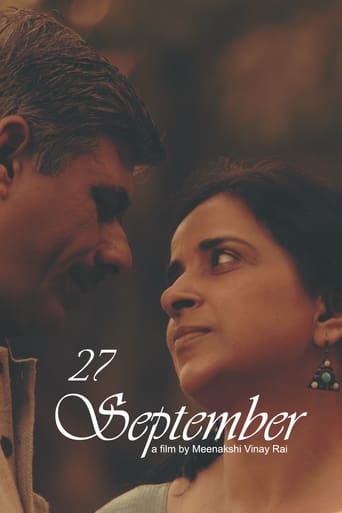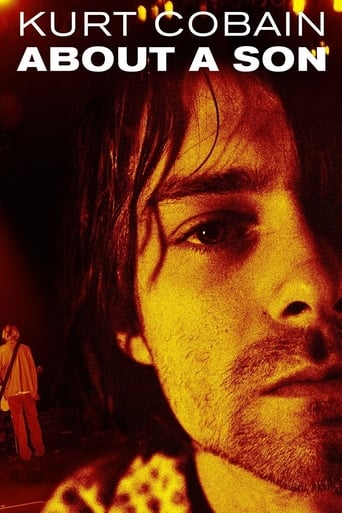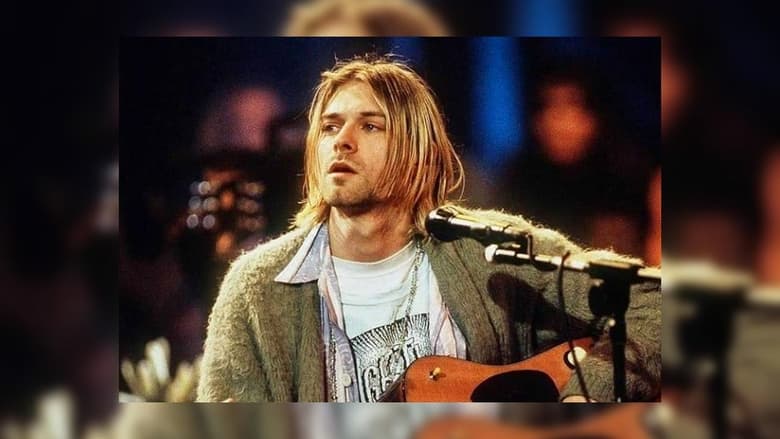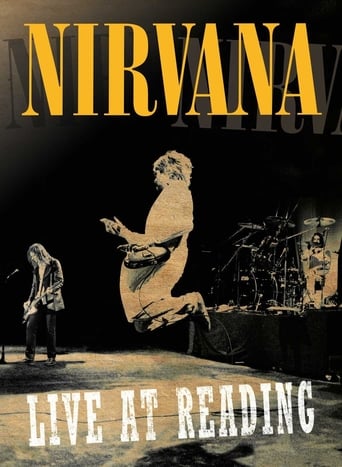Kurt Cobain: About a Son (2007)
An intimate and moving meditation on the late musician and artist Kurt Cobain, based on more than 25 hours of previously unheard audiotaped interviews conducted with Cobain by noted music journalist Michael Azerrad for his book "Come As You Are: The Story of Nirvana." In the film, Kurt Cobain recounts his own life - from his childhood and adolescence to his days of musical discovery and later dealings with explosive fame - and offers often piercing insights into his life, music, and times. The conversations heard in the film have never before been made public and they reveal a highly personal portrait of an artist much discussed but not particularly well understood. Written by AJ Schnack
Watch Trailer
Cast
Similar titles

Reviews
Good concept, poorly executed.
Best movie ever!
The story, direction, characters, and writing/dialogue is akin to taking a tranquilizer shot to the neck, but everything else was so well done.
The film never slows down or bores, plunging from one harrowing sequence to the next.
Utilizing Michael Azerrad's 1992-1993 audio interviews with now-deceased grunge rocker Kurt Cobain as a springboard, director AJ Schnack has fashioned an impressionistic and absorbing, if thinly-derived, account of a reluctant celebrity, one who enjoyed the hungry years much more so than the sudden fame. Born in Abderdeen, Washington, Cobain recounts a carefree childhood up until his parents were divorced around the age of seven (something he found unacceptable); diagnosed with scoliosis in the eighth grade, and quickly turning to marijuana to ease both his spinal and stomach pain, Cobain freely admits he began to exhibit schizophrenic behavior and compulsive disorders. He acknowledges he was offered grants after high school to attend art school (for artwork that we never see) but instead wanted to focus on his music, which got him kicked out of the house. The streets (and friends' couches) seem a bizarre existence for an exceptionally gifted teenager, but Cobain found the independence freeing and fun ("I was being a bachelor!" he says). While Cobain is talking, Schnack's camera roams the streets of Aberdeen, nearby Montesano (where Cobain also briefly lived), Olympia, and finally Seattle, where true success found the icon at last. What appears to be the typical hard-luck road to stardom is shrugged off by Cobain, who always enjoyed the struggle more than the success. The film is a gamble--at times interesting, funny, irritating, and boring--but Kurt Cobain's words speak for themselves, and even non-fans might be intrigued by his unimaginable climb up from nowhere. **1/2 from ****
As kids pre Nevermind even Bleach my friends & I listened to a lot of demos & tapes from Seattle. The list of bands are numerous mostly The Melvins Green River & Soundgarden. We considered Nirvana the runts of the litter and didn't think they would ever make it beyond demos. At the time the word grunge wasn't something we used to describe this kind of metal rock crap we were listening to It was just druggie and hard sounding which fit our lifestyles more than Winger or Poison or even Metallica or Slayer. So when it all exploded it was very surreal kind of like being in a dark room that was suddenly flooded with light & crowded with people. Seattles little secret was no more. So that fact then was hard to digest for me & now some 16 years later as Van Sant & this doc further explore & dig into Cobains life I just think to myself Jesus he wasn't that interesting at all. Why are we still talking about this man as if he were this enigmatic figure who changed the world? Im not going to attack the man but heres where my head is at he left his daughter to be raised by Courtney Love. This is a large part of what makes this country so sick. Your worshiping a dead junkie not some anti-hero who died for his beliefs. This isn't about art or fashion & im not trying to be an a-hole but every time I see this woman benefit from this mans death or see another book another CD another movie I get very very sick to my stomach. Its disgusting & more importantly trivial. You want someone to look up to just take a look in the mirror.
A quiet, slow, but haunting meditation on the late rock hero may be an acquired taste for pre-existing fans, but ultimately ends up being a haunting character study regardless. Why this documentary really sticks out is in it's approach. Guided merely by audio clips of one of Cobain's last, and most in-depth interviews, the director shows long and lingering images of his surroundings while we listen to the troubled, quite misperceived star vent his frustrations with celebrity and recall his modest upbringings.While slightly overlong with silent pauses in between statements, About A Boy is unique, intimate, and ultimately extremely satisfying in distilling some of the myths surrounding this icon and helping to re-humanize him again by giving us the visual counterparts to Cobain's world, without the hype.
Kurt Cobain, lead singer of Nirvana before his untimely death, is often credited by music experts as being one of the most influential musicians of his time. A claim that careful analysis demonstrates to have much credence. Yet he seemed an unremarkable individual. Physical and mental illness. Dropping out of high school. Habitual drug-user. Where did he find the insights that made him such an inspiration to other artists? Making a famous rock-star biopic must be a temptation to fill it with crowd-pleasing footage of their songs. Then link it with candid shots to show the 'real' person. Thankfully, Schnack has steered an alternative course with great integrity in his pursuit for truth. He has looked at how the formative years made the man. The result is not a pat answer underlined with some snappy lyrics. It is a convincing and inspiring portrait of a man who was not easy to know.Twenty five hours of unreleased interviews provide a voice-over for the film. We focus on the period from childhood to when Nirvana attain recognition. These formative years, together with Cobain's own words, give us a feeling for how his music developed. More importantly, they show the pressures on his character. In almost a crucible of personal hell (in spite of the bravado in what he says), Kurt Cobain forged a telling sincerity of expression. That expression of someone who has little choice.Cobain acknowledges many influences, including Led Zepplin, Kiss, AC/DC and the Cars, as well as more obscure bands. But his key experiment was based on mixing seemingly irreconcilable genres. "How successful do you think a band could be if they mixed really heavy Black Sabbath with the Beatles?" he asks.Some bands had approached elements of this already. Zepplin used strident contrasting sections: gentle harmonies would alternate with heavy metal sections. Nirvana invoked not just musical contrasts but extreme disparities of mood and lyrics. Many of their songs flip in a split second from gentle, sensitive, caring sing-along-with-your-mum words - to an extreme violence of sound and imagery. "Come as you are, as a friend," takes on a horrific edge in subsequent verses. The shock value has been duplicated since (usually in a less extreme way) in the structure of music and lyrics by many rock bands, and even seems to filter down to pop groups such as Rihanna and Morningwood.We could equally wonder if it was just part of a general music drift. But the film's insights help even an untrained ear to analyse the trends and Nirvana's role in them.Cobain's life gave him plenty to draw on. Isolated, homeless (in the middle of winter), suffering from ADD and later manic-depression, in his dark night of the soul we can see that his love of music was his only interest. Living in a backwater of Seattle, the only possessions he valued were his artistic nature and the guitar that offered a possibility of expression.There is nothing manufactured about the sound of Nirvana. Its heartfelt honesty perhaps helped to propel the group to wider audiences at a time when indie bands were being methodically sidelined by an avaricious industry. In reaching a wider public, Nirvana also helped to show it was still possible for an unknown band to break through the seemingly invincible wall that dictated what was acceptable.The film's cinematography, still and moving images of the places and sorts of people that populated Cobain's early life, cleverly and almost imperceptibly adds flesh to the raw bones. The bleak Aberdeen backwater. Sleeping under bridges. Spending time in libraries to keep warm. Eventually meeting middle-class youngsters who populate an unsettlingly different world. All through this, the idea for him of simply making enough money to survive was "awesome." Cobain is maybe an extreme example of the double-edged angst felt by many young people. "I was such a nihilistic jerk half the time," he says. "I'm so f*cking sarcastic at times then at other times I'm so vulnerable and so sincere, and that's pretty much how every song comes out - it's a mixture of both of them and that's pretty much how most people my age are they're sarcastic one minute then caring the next." Since the nihilism pervades all of the interviews except where he speaks of music, it is reasonable to believe, against his claims, that he didn't change much. "I'm p*ssed off about everything in general and so all these songs are pretty much about my battle with things that p*ss me off."The words are inelegant and he (technically) contradicts himself on occasion. But the general sense comes through. It is one of the special gifts of cinema to be able to show the bigger picture by putting words in different settings, juxtaposing them with images, to give meanings that could otherwise be missed.Perhaps Cobain is at his most articulate when talking about privacy and the intrusion of the paparazzi. If people believe they have a 'right' to know everything about a celebrity's life, "Then I have a right to try and change that view," he says.Cobain was a tragic character who found happiness in so little and yet affected his artistic field greatly. Schnack's portrait will not satisfy fans that want a pop video of Nirvana songs. It doesn't feature a single one (even though it will increase subsequent enjoyment and appreciation of their music.) Neither will it satisfy the gore-hounds who want to endlessly debate whether his death was suicide or not. Yet somewhere in the misery of Cobain's life was born a spark of creative fire that was far more important. It is hard to imagine how this film could have been less commercial or more true to the quest for that flame.






